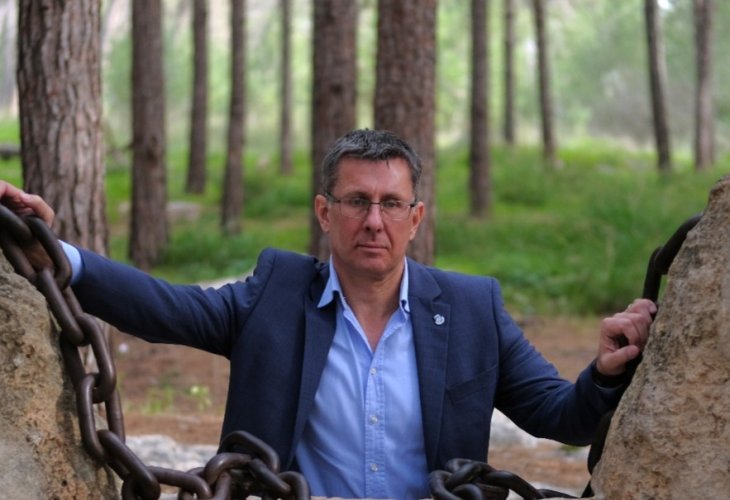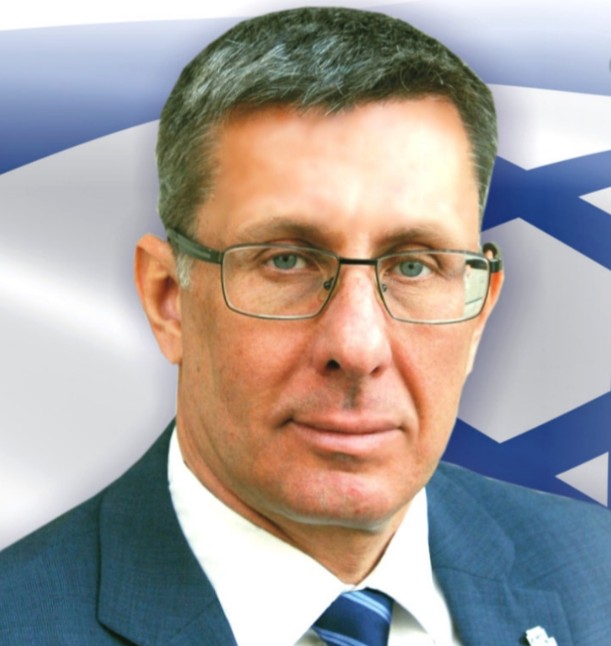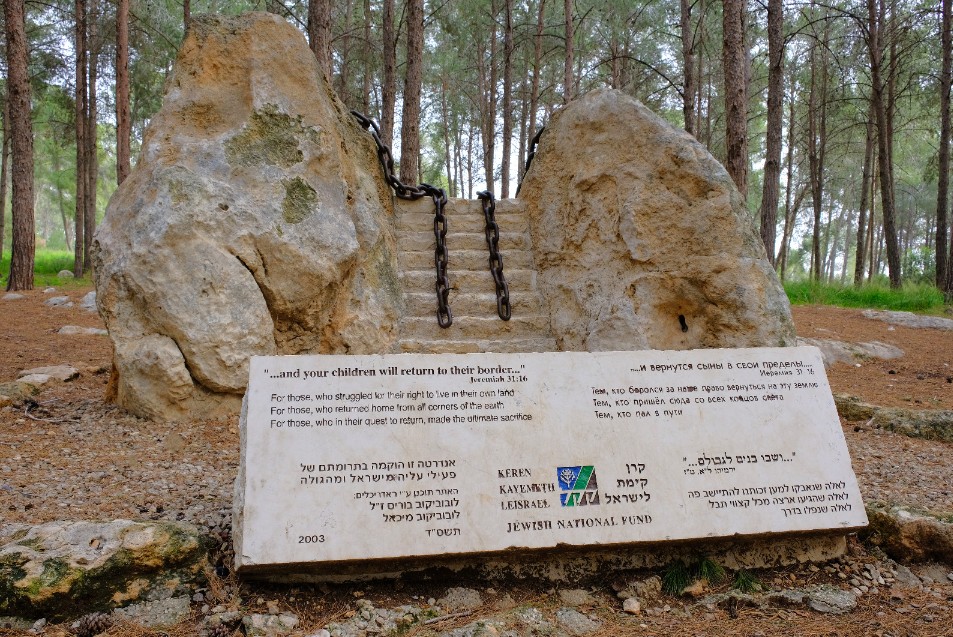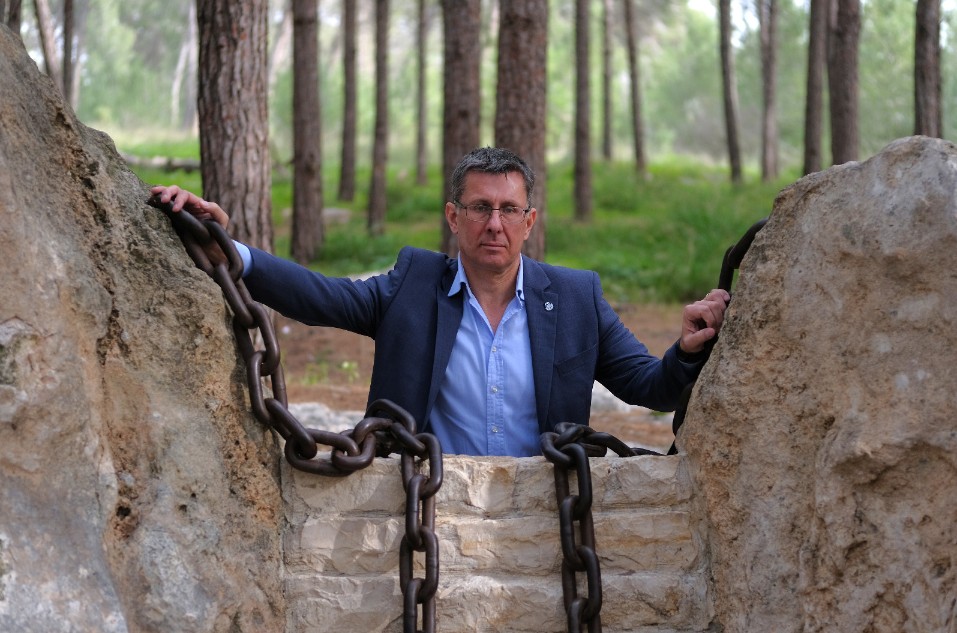"Lieberman is Hindering the Integration of Russian Speakers in the Country"; Michael Lobovikov from Likud in a Fiery Interview
Do all Russian speakers vote for Lieberman? Where does the false claim that the ultra-Orthodox are stealing the country come from? And how can we heal the rift between different factions in the nation? Michael Lobovikov, head of the Likud Immigrants Caucus, talks about everything.

"It is true that I immigrated from the Soviet Union, but I never thought for a moment to vote for Yisrael Beiteinu in the upcoming elections," says Michael Lobovikov, an architect by profession and a Major in the reserves in the Home Front Command's rescue unit. He is a Likud Central Committee member, head of the Likud Immigrants Caucus, and believes that the conflict between different segments of the nation can be resolved differently. In an interview with him, he explains how this conflict actually arose and what can be done after it has grown to such monstrous proportions.

Land - People - Heritage
Michael immigrated to Israel in 1988, with the beginning of the release of Refuseniks in the late '80s. "Because of Zionist activity, my aunt was deported to Israel in 1971, and we kept in touch with her all those years," he recounts. "At a certain point, my parents also applied for immigration, but of course, they were rejected. The immigration request made us complete outcasts in Soviet society. My parents had to resign from their jobs, my sister was expelled from university, and our economic situation was not easy. Within this reality, we joined a group of Refuseniks like us, and I began to be drawn into the extensive Zionist activity that was taking place. If at age 12 I did not know anything about my Judaism, by age 13 I had become a staunch Zionist; I helped print and distribute books on Jewish history and heritage and eventually taught Hebrew clandestinely."
Even before immigrating at age 21, Michael understood that a Jew's connection to the State of Israel must be built on three pillars. "There is a kind of triangle here: land, people, and heritage, and you cannot disconnect the relationship between all three," he explains. "Judaism is the only system in the world that unifies religion and nationality, which creates a strong component of relation to heritage that is indispensable. Whether a person is secular or ultra-Orthodox, if they define themselves as Jewish, they must understand the importance of this triangle and where they fit within it."
What is our status regarding this triangle today?
"Today we are experiencing a crisis that began 200 years ago, during the Enlightenment. At that time, Jews tried to abandon Judaism and integrate into the modern world, but the attempt failed. As a result, Zionism arose, claiming there is only one solution: the rebirth of the Jewish people in their land, but it turns out even that isn't enough. You cannot abandon the third side of the triangle, which is heritage – our religion, history, and cultural identity. The tension between the assimilated world and the world of Torah, which existed even back then, has taken a step forward today. This is expressed in total ignorance regarding heritage knowledge. Secular schools almost do not teach Judaism. The problem is that from this stems an attempt to create an Israeli identity that is not Jewish, which eventually detaches from Israeliness, turning us into a state of all its citizens."
 Monument to the memory of the immigrants and settlers built by Michael
Monument to the memory of the immigrants and settlers built by MichaelWhere does the immigrant community fit into all this?
"The immigrant community faces a deep identity crisis in this situation. These are people who immigrated as Jews, or relatives of Jews, but during the three generations they were trapped in the Soviet Union, they were completely disconnected from Judaism. With their arrival in Israel, they don't get closer to it here either. Most immigrants, who did not study Judaism themselves, often do not understand even basic concepts in the Israeli discourse. If schools were to teach some Judaism, it would give immigrants a way to be intrigued, approach understanding the topic, and try to become a bit more familiar with it. However, most immigrants do not recognize their connection to the heritage or how they relate to the people and the land. For example, when we want to say something happens frequently, we say 'every Monday and Thursday.' An Israeli Jew knows this phrase comes from the Torah being read in synagogues every Monday and Thursday, but a Russian immigrant doesn't have the faintest idea. The immigrants do not know the country, its special places, its history, culture, and religion—none of this exists for them. Then, issues such as the Nation-State Law, the Law of Return, and the question of who is a Jew, sound like Greek to many of them. Unfortunately, only a minority are well-versed in the national heritage."
According to Michael, this situation creates an unbearable ease with which political parties can manipulate the immigrant public into polarization between them and those who keep Torah and mitzvot. "Until now, divisive discourse was an Israeli phenomenon, identified mainly with Tommy and Yair Lapid, but now this phenomenon is beginning to be identified with the Russian public," he says. "For immigrants from the Soviet Union, especially those who are not Jewish, the ultra-Orthodox come from another planet, and they have no identification with them or understanding of what they are talking about. Furthermore, the meeting of the two worlds occurs at challenging junctures—like the rabbinate and conversion system—and for those who do not understand what lies behind all the Jewish laws, it is perceived as some form of aggression. This is where politicians step in, explaining that all the attacks on the immigrant public are because they are Russians."
Michael believes the root of the problem lies in Israel's deep identity crisis. "The modern Israeli identity has not been defined. On one side, there are those who reject Judaism; on the other, those who reject Zionism. Between these two extremes, we are separated into different communities and streams, without a connection to one nation. If the Israeli public can't build its own identity, it certainly won't pass it on to the immigrants. Some Soviet immigrants have already integrated into Israel, but many still feel like outsiders."
Do you see an end to this conflict? After all, everyone holds on to their side
"I don't think there is an end to it, but if until now we've been balanced and it was clear that Israel is a Jewish state, right now we are on a slippery slope trying to abandon this definition and become a state of all its citizens. This puts us in a state of assimilation within the country, with the outcome being that, as with American Jews, Judaism will disappear. We don't want to reach that point, hence we need a Jewish identity where the common thread between us is that triangle of land, people, and heritage."

Lieberman's Secrets
The ongoing elections for nearly a year have painfully exposed the polarization between different sides of the populace. "Lieberman identified a public that isn't oriented towards Israeliness and Judaism and went for it, with dangerous extremism," explains Michael.
What percentage of Soviet immigrants do you think vote for him?
"A third of Russian speakers vote for Lieberman, which in numbers is less than 200,000 people. In Israel today, there are over a million Russian speakers, of whom 700,000-850,000 have the right to vote. If voter turnout is 65%, this means that 600,000 of those with the right to vote actually go to the polls. So two thirds of the Russian-speaking population doesn't vote for Lieberman at all. One-third votes for Likud and another third is spread among other parties, mainly on the center-right of the political map."
So who does vote for him?
"Mainly older immigrants who vote for Lieberman out of habit. These are people who often do not understand Hebrew and are unfamiliar with Israeli politics. They rely on Russian-language media, which only talks about him, so it's a default choice for them. For the same reason, even new immigrants choose him. But the rest of the Russian-speaking public votes similarly to Israelis, with a slight rightward tendency. Aside from those captive by Lieberman, he now tries to recruit the religionless and identityless. These are people who do not feel part of the Israeli experience, so many have not voted until now. However, now they feel they belong, because Lieberman has tagged them and also tagged their 'enemy.' Fear and hatred are two emotions that when inflamed in a campaign—succeed, and this is precisely the manipulation Avigdor Lieberman is enacting on public opinion."
And is there anything wrong with giving this crowd representation?
"The downside here is that it's deliberate incitement and spreading lies with an antisemitic nature. The messages conveyed in such campaigns are very primitive and not at all substantial. To claim that mikvah attendants steal state money, or that the ultra-Orthodox community is poor and uneducated just because they did not study core curriculum subjects—these are not serious claims and they resemble classic antisemitic clichés, which is why I call them so. Unfortunately, it works on some people, some out of ignorance, and some because they do not identify as Jewish, or they feed off their hatred of the other."
But if Lieberman has so many voters, perhaps some identify with him?
"Look, people are told that the ultra-Orthodox receive more funding and factually it’s not true. Anyone who reads reports knows that the rest of the public in the state is funded no less and even more; people are told that the ultra-Orthodox live off the state, when in fact most of them work and pay taxes; 75% of Haredi women work, compared with 70% of women in the general public, and 55% of Haredi men work versus 67% in the general public. These are not such large gaps. Additionally, when it comes to education, the situation is much worse. Why does a person pursuing a PhD in Chinese philosophy at university receive state money, but a yeshiva student doesn't? Both are not productive, so why can one be funded and the other not? Regarding school children, a Haredi student is funded at half the amount of a secular student, but that is not discussed. Yes, some of the Haredi public chooses not to study core subjects, but they are also funded by the state much less. If you think about it, in the Arab education system they also don’t study exactly what we’d want—including even a high level of Hebrew, but they are funded by the state. Another example is that two months ago, they published matriculation eligibility statistics, and at the top were Haredi and religious yeshivas, so where are the uneducated people they talked about? We need to stop the lies and engage in honest and genuine discourse. It will certainly be tumultuous and stormy, but it is the only thing that can create closeness after the divisive discourse of this election, which has thrown us off balance."
Do you think this discourse has an audience?
"It has a much bigger audience than people think. I live in north Tel Aviv, meet completely secular people, and suddenly discover someone attending a Mishnah class in the evening, which is important to them. They dedicate time to the class and see it as part of their culture and identity. At the synagogue on Shabbat, I see secular people who, instead of continuing to sleep, get up in the morning, and feel it's important for them to come to the prayer. A connection to the source is developing among many people. Personally, I put on *tefillin*, and it was important to me to send my children to a religious school to at least know something. A secular school does not cultivate Jews, and the Torah lessons there are a joke. The Torah is taught there as stories and legends from a distant past, barely marking the holidays. Today there is a growing demand for schools that integrate heritage, and that’s a fact. All this is what the divisive discourse is currently trying to destroy."
So what can be done?
"As I’ve already said – communicate with respect and honesty, without lies. Only in this way will we find a way to live here together. And most importantly – we must continually remind ourselves that we can sustain only as one people, who do not give up on their land, heritage, or the identity that preserved us through two thousand years of exile. Israeli society must continue this for future generations and not break the continuity."

